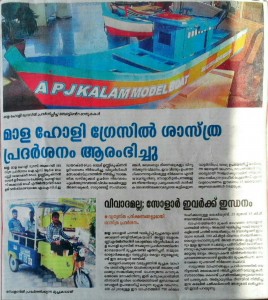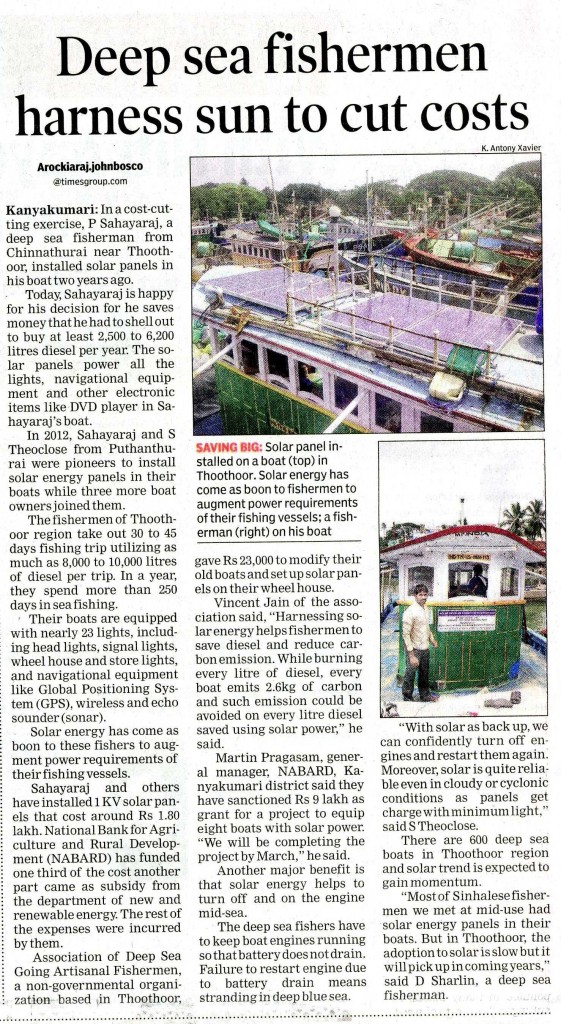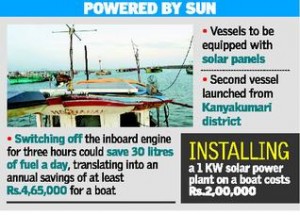News Clipping
Article: Deep sea fishermen harness sun to cut costs
See the latest news article — this one in the Times of India — on ADSGAF and the deep sea fishers as they use solar power to reduce their costs and their carbon footprint at sea.
You can also read the article on the ToI site by clicking here.
Down to Earth article: ‘Centre’s revised guidelines for deep sea fishing anger fishers’
The Central government has issued revised guidelines for deep sea fishing by big ships in the country’s exclusive economic zone (EEZ)—an area of the sea between 22 km and 370 km from the coast, beyond the territorial waters.
The guidelines permit deep sea fishing with letter of permission (LoP) from the Centre.
The guidelines were issued even as fisher communities in 10 coastal states are agitating against an expert committee report that recommended giving letter of permission for more big vessels in EEZ.
Please read the full article linked here and add your comments on this important issue.
Headlines from the shark conservation mission meeting in Mangalore
The work of ADSGAF and partners in organizing the third mission meeting in Mangalore has attracted headlines in regional and national newspapers.
Click the links below to see coverage of this important effort.
ADSGAF and KSMTF call for rejection of proposed deep sea fishing policy
From the New Indian Express after a meeting this week in Trivandrum:
THIRUVANANTHAPURAM: The Union Government should not go ahead with the implementation of the Dr Meenakumari Report on fishing sector, the Kerala Swathanthra Matsyathozhilali Federation state committee has demanded.
Inaugurating a workshop on deep sea fishing policy, organised by the Federation in association with National Fishworkers’ Forum and Association of Deep Seagoing Artisanal Fishermen in the city the other day, Labour Minister Shibu Baby John opined that implementing the report will bring the fisheries sector in the state to a major crisis and hence the Centre should not approve the report.
Implementing the report would adversely affect the fisheries sector in the state, he pointed out, adding that it’s time the traditional and small-scale fishing sector in the state are modernised to give a fresh impetus to the fisheries sector here. Fishermen organisations in the field should come up together against Dr Meenakumari report.
The state government would take all possible steps to convince the Union Government on the concerns raised by the fishermen. Traditional and small-scale fishermen should be encouraged for deep sea fishing while foreign vessels would be asked to stay away from this sector, Shibu Baby John said.
Presiding over, National Fishworkers’ Forum secretary T Peter said any attempt to prevent fishermen from carrying out their livelihood activities would be opposed.
The forum would organise protests at the national-level against this, he said. D Sanjeev Ghosh and Vince Jain presented resolutions at the workshop. S Raveendran Nair, Joseph Xavir Kalappurackal, Neythil Vincent, V K Madhusoodanan, Satheesh Babu, Fr Mathyas Oliver, P P John, Anto Elias, V Romance and Jackson Pollayil also spoke.
Fishing boats become part of race to cut carbon
The Hindu newspaper this week published a feature that relates to ADSGAF’s work to install solar panels on fishing boats:
Fishing boats to reduce carbon footprint
Hundreds of deep sea going fishing boats operating from Kerala and Tamil Nadu will soon be key players in a global bid to cut carbon emissions.
The Association of Deep Sea Going Artisanal Fishermen (ADSGAF) has taken up a pilot project to equip fishing vessels with solar panels so as to save fuel on long voyages and reduce the carbon footprint.
The second boat under the NABARD-funded project was put out to sea from the Muttom harbour in Kanyakumary district on Sunday. The first vessel fitted with solar panels had begun operations from the Thoppumpadi harbour, Ernakulam, in May this year.The solar panels are used to charge the battery which powers the GPS navigation equipment, fish finder and two VHF sets for communication, as well as signals and other lights on board.
Fishermen’s fears
“At sea, fishermen keep the boat’s engine running continuously, fearing they will be stranded if it refuses to restart,” says Vincent Jain, Chief Executive, ADSGAF. “By partly switching over to solar energy, they save fuel while cutting down on carbon emission”.
The boats usually remain at sea for about 15 days. Trials carried out by ADSGAF proved that switching off the inboard engine for three hours could save 30 litres of fuel a day, translating into an annual saving of at least Rs.4,65,000 for a boat.
For more of the story, click here.
Fishers flay decision on Marine
From the Hindu regarding the marines charged in the death of ADSGAF fishers:
The National Fishworkers’ Forum (NFF) and the Kerala Swathanthra Malsya Thozhilali Federation have come out strongly against the decision to send Massimiliano Latorre, one of two Italian marines involved in the killing of two fishers off the Kerala coast, to Italy for treatment.
In a joint statement here on Saturday, NFF secretary T. Peter and federation secretary Anto Elias termed the decision a challenge to the fishing community in India. By observing silence in court on the issue when there were sufficient treatment facilities in India, the Union and State governments had bowed to the dictates of the Italian government, they said.
Mr. Peter and Mr. Elias said the stand taken by Prime Minister Narendra Modi and Chief Minister Oommen Chandy was a disgrace for the country and wondered whether the Italian marine would return after treatment. Fishers would stage a sit-in in front of the Secretariat on Tuesday.



